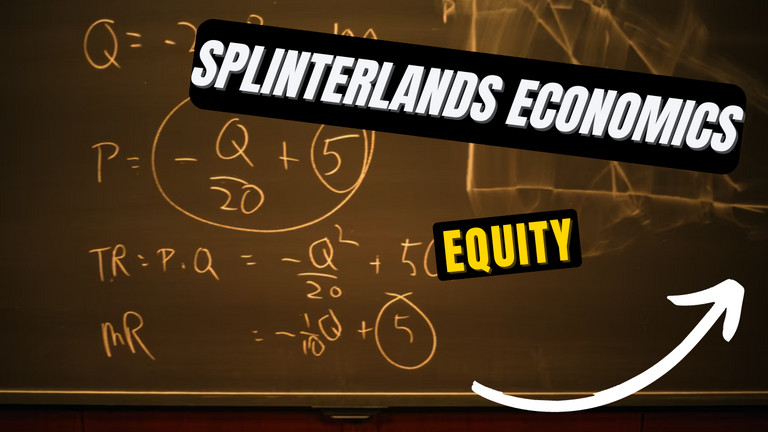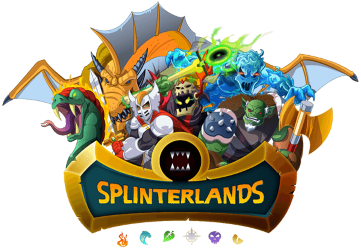Splinterlands Economics: Equity
Hello everyone! We are back again today with another edition of Splinterland Economics - a series in which we introduce a basic economic concept and then apply it to Splinterlands. If this is your first time reading, just to tell you a little bit about myself: my day job is in an unrelated area but I consider myself a little bit of economics nerd - I read a little (or maybe way, way) more news than I should, double majored in econ, and am obsessed with optimization. I love the way Splinterlands is equal parts card game and resource allocation game. My goal with these articles is to share a little bit of what I know with you all.
Our subject today is a key concept when it comes to investment and ownership, and should be of particular interest to Splinterlands players in light of recent events in the ecosystem. It has accounting as well as general analysis applications, and is something that is helpful to keep in mind while digesting daily news and announcements. Today, we'll be talking about Equity!

What is Equity?
Equity deals with the ownership of an asset - your home or car, a company, or some other type of asset. The term "equity" refers to the accounting value of owning that asset (either fractionally or in whole), as well as measuring the way in which ownership is assigned to individuals. Having equity in something means that someone has a stake in an asset and has an interest in its success. Many companies will give employees equity as part of their salary or compensation, because not only does it effectively increase employee compensation without actual cash outflows, but it will also align employee incentives with the performance of the company.
Having equity means that as an equity holder, you want to see that asset do well. If you have shares of a company then when that company is successful then you will likely be able to sell those shares for a higher value, and/or receive dividends as a portion of the company revenue. You will often (though not always) also get to have a say in company matters through shareholder votes. There may also be additional perks for holding equity - I own shares of an automobile manufacturer who runs a program which offers more favorable pricing for shareholders!
Equity is also important to the original or controlling business owners, and can often be used as a way to obtain additional cash in order to fund company operations. For example, venture capitalists will usually provide cash or other capital to a business in return for some amount of equity, or ownership, in that company. If you hear about public offerings (such as an IPO) or rounds of raising capital, those are both examples of a company deciding to sell some of its equity in order to obtain more cash. Entrepreneurs should hate giving up equity in the business because they are selling off a portion of their company, but if the additional capital can help the company to grow more quickly or operate longer than it could otherwise then doing so can make sense.
How do we apply it to Splinterlands?
In Splinterlands there are multiple examples of equity dynamics being at play. Splinterlands the company is a business which has gone through rounds of funding. This means that equity in the Splinterlands (the company) is spread out across multiple different entities - likely venture capitalists, in addition to early founders and anyone else who has received equity in the company. If you hear in a town hall about a board of directors, then oftentimes those directors either have equity in the company themselves, or have been appointed by someone else who does. This is relevant because those directors have the task of looking out for the interests of stakeholders, and will often have input on which actions the company takes.
Another place where equity is at play is with the SPS currency. While SPS is not a traditional stock or share of a company, it is a voting token for the SPS DAO, and ownership of staked SPS gives you a say in governance of the DAO through proposals, as well as the possibility of unstaking and selling that SPS at a later date. In the case of SPS, you even receive "dividends" in the form of additional SPS and vouchers when you hold staked SPS. As you may be able to tell from the description, SPS may be thought of as equity in the SPS DAO.
Why should we care?
Knowing how equity works and how it is distributed gives us additional insight into how companies work and the ways in which incentives are aligned in order to understand current events. When Aggy and Matt discussed raising capital in the wake of staff layoffs, they mentioned that they were considering raising capital by selling off a portion of their equity in the company. They were also careful to note that they would still retain a controlling amount of equity - important because if you don't have a controlling amount of equity, then you can get overruled in company decisions.
Understanding equity also helps us to better evaluate our investments outside of Splinterlands. It is entirely too easy to get caught up in charts, memes, or FOMO and to lose sight of the fact that investment means that you are using your capital to gain ownership of something. Making sure that you actually want to own a piece of whatever you are buying, and that you are not just purchasing random stuff, is a key step in making smart investments!
Thank you so much for reading all the way to the end. Interested in seeing some more of my writing in the future? Be sure to give me a follow! In the meantime, if you'd like to see some of my recent posts:
Shaking Things Up - Using Dragons in Battle! - Last week's battle challenge, featuring the Dragon splinter!
Splinterlands Economics: (Financial) Contagion - An introduction to the concept of a Contagion, and how we can apply it to Splinterlands!
Splinterlands Economics: Nash Equilibrium - A introduction to the concept of a Nash Equilibrium, and the insights it can give us into Splinterlands.
Thinking about giving Splinterlands a try but haven't signed up yet? Feel free to use my referral link: https://splinterlands.com?ref=bteim, and be sure to reach out to me if you have any questions!
All images used in this article are open source and obtained from Pixabay or Unsplash. Thumbnails borrowed with permission from the Splinterlands team or made in Canva.




!1UP Great content!
Thank you! 😄
You have received a 1UP from @underlock!
@monster-curator, @oneup-curator, @leo-curator, @vyb-curator, @pob-curator, @fun-curator
And they will bring !PIZZA 🍕.
Learn more about our delegation service to earn daily rewards. Join the Cartel on Discord.
I gifted $PIZZA slices here:
@curation-cartel(12/20) tipped @bteim (x1)
Learn more at https://hive.pizza!